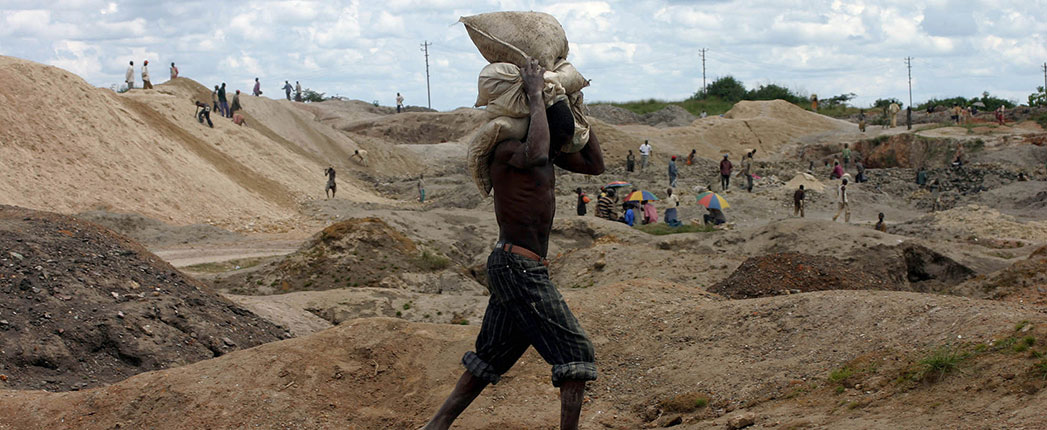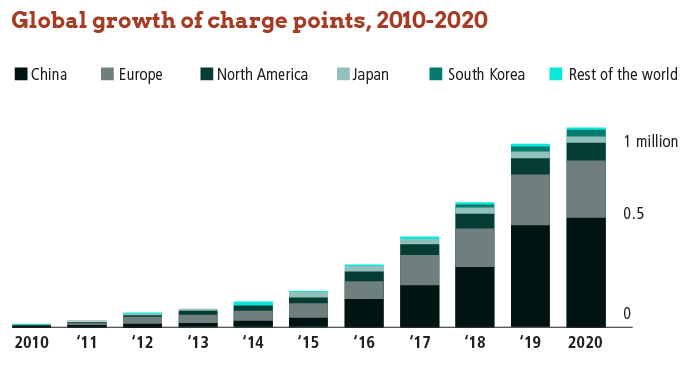
News from around the world of charging networks and batteries.
Expansion of charging networks continues apace, as the number of charging points in the world passed 1 million earlier this year, according to data compiled by Bloomberg. That rapid expansion looks set to continue in the major EV markets of China, which saw the most new installations, followed by Europe and the United States.

AMERICAN CELL: GM said it would expand its network of public fast chargers by 2,700 new solar-powered units with partner Evgo, the operator of the country’s largest fast charging network, starting in 2021. The announcement came after the U.S. car giant reported losses of $800 million in the second quarter of 2020, as the COVID-19 pandemic tore through its business. The two companies said they would install the points at grocery stores, retail outlets, entertainment centers and at other high-traffic urban and suburban locations. GM has been slow to develop its charging business, despite producing its first EV almost 25 years ago.
Caribbean power generation company InterEnergy tapped Blink Charging for another 150 fast-charging stations for the Dominican Republic to the tune of $1 million, in addition to $1.2 million for 200 charging stations previously. Meanwhile, Blink signed an interoperability agreement with U.S. charging network company SemaConnect to allow users to seamlessly roam between the two operators’ charging networks.
Volkswagen’s DC charging division Electrify America will install ultra-fast charging stations at seven locations operated by Love’s Travel Stops, a highway service station chain. The locations will fill in some gaps in VW’s fast-charging network in the U.S.
Australian e-mobility tech company Tritium made public its 175 kW fast charger RT 175-S, the first such equipment in the U.S. with the Plug and Charge communications protocol that authenticates and bills customers via the charging cable without the need for a card.
Tesla donated to the Canadian parks authority a number of its Destination Chargers. Meanwhile, the company is devising a payment system for its 22 kW Destination Charger wall boxes located in hotels and restaurants. Destination Chargers are free for Tesla drivers as long as they are patrons of the businesses where points are located. It also opened Beijing’s first supercharger location with third-generation charging stations up to 250 kW.
BP-funded charge company FreeWire installed its first ultra-fast Boost Charger at a fuel and convenience store in Lodi, California. The novel technology uses an integrated battery as a buffer to boost output from the charger.
CONTACTLESS CHARGING: ElectReon Wireless, an Israeli company developing wireless charging for EVs in motion, is working with German power company EnBW to use its technology on a bus route in Karlsruhe. This is the company’s third such project after one in Israel and another in Sweden. Last month, the company raised $50 million in an equity drive.
Michigan’s Department of Environment, Great Lakes and Energy opened a publicly available $1.7 million fund that will provide up to $70,000 apiece for 36 fast-charging stations.
U.K. ON POINT: New charge points are popping up all over the U.K., installed by a roster of companies. In London, startup Trojan Energy is piloting a 22 kW charge point that sinks into the pavement when not in use. The company is installing 200 units in the boroughs of Brent and Camden, helped by a £3 million grant from the government’s Innovate U.K. fund. Connected Kerb will install more than 130 points at a new 3,000-home development near Swindon. Birmingham council is installing 394 fast and rapid chargers to support a new fleet of EV taxis.
Nissan and E.On have developed and installed and successfully deployed 20 vehicle-to-grid chargers at Nissan’s European Technical Center in the U.K. Similar to smart charging, vehicle-to-grid systems can increase or decrease power supply to the vehicle as needed, as well as return energy to the grid from the battery to balance cycles of power production and consumption.
TRANS-EUROPE EXPRESS: Romania’s Enel X installed 34 charge points around Bucharest, mostly 22 kW AC and some 50 kW DC units. The company’s JuicePass app gives users access to more than 50,000 public charging points in Europe
Swiss engineering company ABB will send 250 of its Terra 184 rapid-charging stations to Japanese company e-Mobility Power to replace older, slower units.
CATL CLASS: CATL, China’s largest battery manufacturer and supplier to Tesla, VW, Volvo, SAIC and Honda, among others, is developing new technologies for its batteries. One innovation is a cell free from nickel and cobalt. Another is getting rid of the battery module holding cells in the battery pack to instead create a “cell-to-chassis” design that integrates the cells into the frame of the car, thus increasing energy density. Chinese compatriots Geely Power Battery, the offshoot of the vehicle maker of the same name, formed a $1.2 billion joint venture with CATL to build a new battery factory in Sichuan Province. Finally, Trailer Dynamics, a German long-haul truck builder has contracted CATL to design and supply batteries for its Newton eTrailer.
South Korea’s LG Chem is faring slightly less well, however. It is being investigated by the European Commission for potential misapplication of a €95 million grant for a cell production facility in Poland. Concerns center on whether the grant constituted an incentive and exceeded limits. On a more positive note, fellow Koreans Hyundai and SK Innovation are discussing expanding their battery supply deal to include battery repair, rental, reuse and recycling services. SK Innovation is also developing a cell that mostly uses nickel. Ford has expressed an interest in the technology for an electric version of its F-150 pickup.
AROUND EUROPE: Akasol, a German EV battery systems manufacturer, saw sales rise by more than 25% in the second quarter of 2020 from the first quarter. It comes as a ray of sunshine amidst the pandemic’s gloom and bodes well for the Darmstadt-based company, which is busy building a new production line in the U.S., set to open in 2021.
Cobalt is one of the key materials in lithium-ion batteries. Much of it is found in the Democratic Republic of Congo, which has been scarred by conflict over control of this strategic resource. A group of industry companies formed the Fair Cobalt Alliance to promote better mining practices, recently joined by Sono Motors, a Munich-based start-up and the first EV maker to become a member.
France’s PSA is rumored to have ordered 7 GWh worth of batteries from Svolt, an offshoot of Chinese EV company Great Wall.
Panasonic, which makes cells at Tesla’s Nevada Gigafactory 1, said it would throw down $100 million on another production line to up capacity by 10%.
Coreshell Technologies, a Californian coatings company, raised $4 million in financing to develop a coating to minimize EV battery degradation and extend service life. The company is working with BASF to test for effectiveness using Bosch’s battery materials.

Sorry, a technical error occurred and we were unable to log you into your account. We have emailed the problem to our team, and they are looking into the matter. You can reach us at cs@lubesngreases.com.
Click here link to homepage